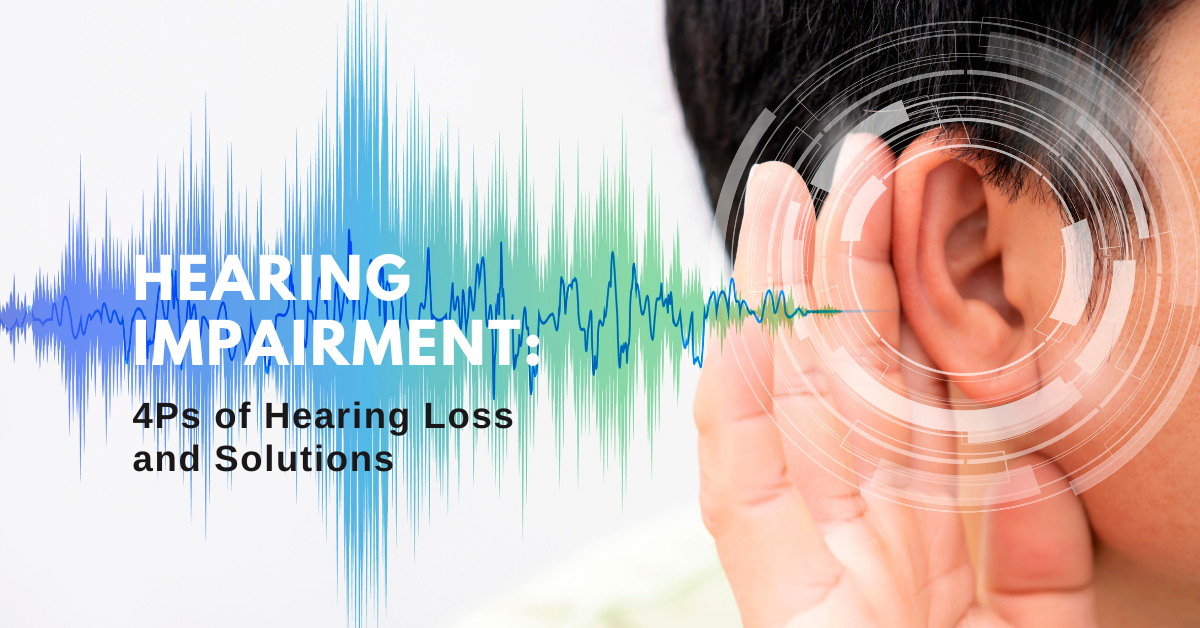Hearing impairment is the partial or complete inability to perceive sounds accurately that has affected numerous people worldwide. According to the World Health Organization’s (WHO) latest report “World Report on Hearing”, over 1.5 billion people have hearing impairments. The report further states that out of the 1.5 billion people, 430 million have moderate to higher levels of hearing loss and can be affected severely unless conditions are addressed on time. To effectively manage hearing loss and find the right solution, you must understand the different categories of the 4 Ps of hearing loss.
These 4 Ps provide an overview of the different levels of hearing impairment and help in selecting the right hearing aid to address the condition. However, you must always consult a hearing aid clinic to understand your issue better and get the right solution. In the following blog, we will categorize the 4 Ps of hearing loss and also suggest the type of hearing aid that you can use to improve auditory perception.
1. Progressive Hearing Loss
Progressive hearing loss refers to a hearing impairment where a person loses his or her hearing ability over some time. This hearing loss often surfaces in the form of mild hearing inability but worsens over time.
Causes of Progressive Hearing Loss
Progressive hearing loss can occur due to:
- Age-related changes
- Exposure to high noise
- Genetics
- Specific medical conditions
2. Painless Hearing Loss
Painless hearing loss refers to hearing inability that does not result in any discomfort or pain in the ears. Therefore, painless hearing loss can affect a person gradually and subtly but with severe effects. Furthermore, this hearing ailment can often go unnoticed until a person faces significant issues while communicating.
Causes of Painless Hearing Loss
The most common factors that can cause painless hearing impairment include:
- Aging specifically presbycusis
- Genetical reasons
- High noise exposure
- Ototoxic medications
- Specific medical conditions
3. Permanent Hearing Loss
Permanent hearing loss refers to the long-term hearing impairment caused by unalterable damage to the auditory system. Unlike progressive, painless, and preventable hearing loss, medical treatment or interventions cannot address permanent hearing impairment completely. Therefore, this hearing loss can severely affect communication, emotional well-being, and social interaction.
Causes of Permanent Hearing Loss
Some of the factors that may cause permanent hearing loss include:
- Aging
- Autoimmune inner ear disease (AIED)
- Genetics
- Infections like measles, meningitis, mumps, or otitis media
- Injuries to the head or skull
- Prolonged or repeated exposure to loud noises
- Ototoxic medications
- Unaddressed tumors like acoustic neuromas
4. Preventable Hearing Loss
Preventable hearing loss refers to a hearing impairment that can be addressed through preventive measures and timely medical treatment. Individuals who have preventable hearing loss must consult with audiologists or hearing aid clinics to receive instructions on how to implement the right strategies to minimize and manage hearing loss.
Causes of Preventable Hearing Loss
The following parameters can result in preventable hearing loss:
- Exposure to excessive noise
- Subjection to ototoxic substances
- Irregular check-ups and delayed treatment
- Neglect of hearing protection devices
How Hearing Aids can address Hearing Impairment?
Although hearing aids may not cure the 4 Ps of hearing loss, they can help improve auditory perception and deliver the following benefits:
1. Amplifying sounds:
Hearing aids amplify specific frequencies to improve speech comprehension and inaudible/faint sound perception. Hence, hearing aid devices significantly improve the clarity of conversations and sounds even in noisy environments. Furthermore, they also reduce the strain related to hearing and perceiving audio on hearing loss-affected individuals.
2. Dealing with anxiety, depression, and social anxiety:
According to a study by the Cleveland Clinic’s Center for Geriatric Medicine, hearing loss can lead to depression and isolation. When individuals fail to hear conversations and noises around them, they withdraw from numerous daily activities. Furthermore, hearing loss can also lead to depression, according to the International Journal of Geriatric Psychiatry (2003).
Hearing aids can improve the auditory perception of individuals and encourage them to engage in daily and social activities. Hence, these devices can bring people out of isolation and loneliness caused due to hearing loss.
3. Maintaining cognitive abilities:
According to a NHI report, older adults suffering from hearing impairment have developed dementia over time. The report further states that the administration of hearing aids can not only improve hearing ability but also reduce the development of cognitive problems.
4. Reducing accidents:
According to a study in The Journal of the American Geriatric Society, adults over 60 years with hearing impairment in both ears fall more. The study further states that using hearing aids can reduce the chances of falling by 2.4 times.
Apart from that, hearing aids can help individuals improve their perception of traffic sounds, alarms, and other environmental cues. This can reduce the chances of accidents caused by hearing loss to a great extent.
5. Prolonged living:
According to a study by the Lancet Healthy Longevity Journal, American adults who use hearing aids regularly to address auditory impairment have lower chances of dying. Furthermore, the University of Southern California also conducted a study that surveyed 10,000 participants. The research stated that individuals who use hearing aids regularly have a 24% lower chance of early death compared to those who do not.
Conclusion
Therefore, to address auditory impairment it is important to understand the 4 Ps of hearing loss and get the right solution. Technological advancement in hearing aids and the numerous treatment options have provided hope to people suffering from this impairment. However, to effectively address this issue, you must consult with a reputed hearing aid clinic or audiologist on time. Since it can enhance communication, improve quality of life, and promote hearing health.

